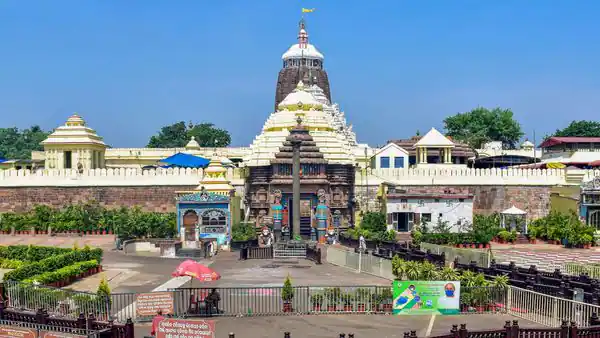India is known as the land of spirituality, where ancient traditions and wisdom have thrived for thousands of years. One such sacred practice is the Jagannath Dharma, a unique spiritual path that seeks to bring individuals closer to God and attain enlightenment.
Jagannath Dharma is primarily associated with the Lord Jagannath temple located in Puri, Odisha. The deity worshiped in this temple is Lord Jagannath, an incarnation of Lord Vishnu. The temple attracts millions of devotees every year, from all corners of the world, seeking solace, blessings, and divine union.
The journey of Jagannath Dharma begins even before reaching the temple. The devotees undertake a spiritual pilgrimage called the Rath Yatra, where the deities of Lord Jagannath, Lord Balabhadra, and Devi Subhadra are carried in grand chariots through the streets of Puri. This tradition dates back thousands of years and is believed to cleanse one’s sins and grant liberation.

The philosophy of Jagannath Dharma is rooted in the belief that God resides within every living being. The temple is considered the abode of the Lord, and devotees enter with a sense of humility, surrender, and devotion. It is believed that by offering prayers, participating in rituals, and immersing oneself in the divine atmosphere of the temple, one’s soul is cleansed and nurtured.
You can read our another post on Twin Temple of Gandharadi: A Marvel of Ancient Architecture
The temple rituals are performed with great precision and devotion, keeping alive traditions that have been passed down through generations. One of the most famous rituals is the offering of Mahaprasad, a sacred meal prepared using traditional recipes and cooked in earthen pots. It is believed that partaking in this prasad grants spiritual elevation and purifies the senses.
Jagannath Dharma is not confined to the temple alone. Its teachings emphasize the importance of leading a virtuous and ethical life. The Dharma advocates selflessness, compassion, and service to humanity as a means of attaining enlightenment. Thus, followers of Jagannath Dharma are encouraged to engage in acts of charity and kindness towards all beings.
The practice of Jagannath Dharma has played a significant role in shaping the culture and religious practices of Odisha. It has influenced art, music, dance, and literature, with numerous compositions dedicated to Lord Jagannath. The annual Odissi dance festival, held in Puri, is a testament to the profound impact of Jagannath Dharma on the performing arts.
For devotees, Jagannath Dharma is not just a religious practice; it is a way of life. It provides solace, instills moral values, and brings individuals closer to divine consciousness. The devotees firmly believe that Lord Jagannath guides and protects them in their journey towards enlightenment.
In a world filled with chaos and distractions, the teachings of Jagannath Dharma offer a sanctuary for spiritual seekers. The Lord Jagannath temple becomes a refuge, not only for locals but also for people from all walks of life, who seek solace and a deeper connection with a higher power.
More: Wanted to download Odishashop.com visit here
So, whether you are a devotee of Lord Jagannath or someone intrigued by ancient spiritual traditions, a visit to the Lord Jagannath temple in Puri and an exploration of the Jagannath Dharma can be a transformative experience. It is a journey that will not only bring you closer to God but also awaken the divinity within you.
Write A FAQ For Jagannath Dharma
1. What is Jagannath Dharma?
Jagannath Dharma is a religious belief system centered around the worship of Lord Jagannath, a form of Lord Vishnu, primarily popular in the Indian state of Odisha.
2. Who is Lord Jagannath?
Lord Jagannath is considered to be an incarnation of Lord Vishnu, the preserver and protector among the Hindu trinity. He is the primary deity worshipped in the Jagannath Temple in Puri, Odisha, along with his siblings Balabhadra and Subhadra.
3. What are the main practices and rituals associated with Jagannath Dharma?
Devotees of Jagannath Dharma engage in several practices and rituals, including daily puja (worship), recitation of religious texts like the Jagannath Astakam and Srimad Bhagavad Gita, chanting of Vishnu Sahasranama (thousand names of Lord Vishnu), and observance of various festivals like Rath Yatra (Chariot festival) and Snana Purnima (bathing ceremony).
4. What is the significance of the Rath Yatra festival?
The Rath Yatra festival, also known as the Chariot festival, is one of the most significant events in Jagannath Dharma. During this festival, the deities of Lord Jagannath, Balabhadra, and Subhadra are taken out of the Jagannath Temple in lavish chariots and pulled through the streets by devotees. It is believed to give an opportunity for devotees to have darshan (sacred viewing) of the deities and seek their blessings.
5. Are there any dietary restrictions or principles in Jagannath Dharma?
Yes, Jagannath Dharma follows certain dietary restrictions and principles. Devotees typically adhere to a vegetarian diet, and the offering of food to Lord Jagannath, known as ‘Mahaprasad,’ is considered highly sacred. It is believed that consuming this holy food brings spiritual purity and blessings from the deity.
